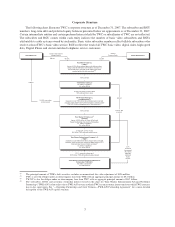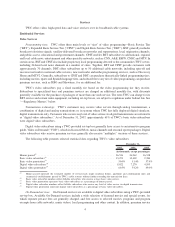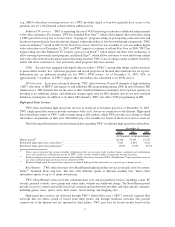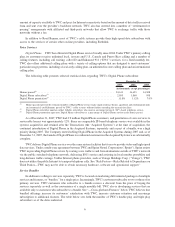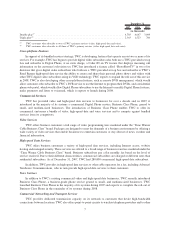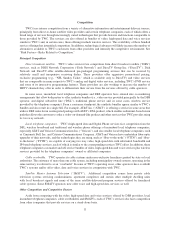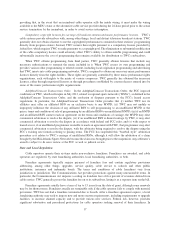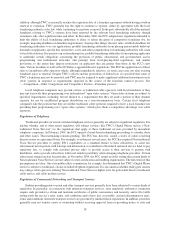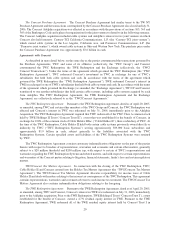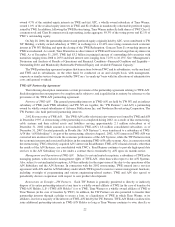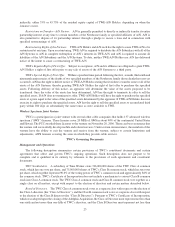Time Warner Cable 2007 Annual Report Download - page 18
Download and view the complete annual report
Please find page 18 of the 2007 Time Warner Cable annual report below. You can navigate through the pages in the report by either clicking on the pages listed below, or by using the keyword search tool below to find specific information within the annual report.Regulatory Matters
TWC’s business is subject, in part, to regulation by the FCC and by most local and some state governments
where TWC has cable systems. In addition, TWC’s business is operated subject to compliance with the terms of the
Memorandum Opinion and Order issued by the FCC in July 2006 in connection with the regulatory clearance of the
Transactions (the “Adelphia/Comcast Transactions Order”). Various legislative and regulatory proposals under
consideration from time to time by Congress and various federal agencies have in the past materially affected TWC
and may do so in the future.
The following is a summary of current significant federal, state and local laws and regulations affecting the
growth and operation of TWC’s businesses as well as a summary of the terms of the Adelphia/Comcast Transactions
Order. The summary of the Adelphia/Comcast Transactions Order herein does not purport to be complete and is
subject to, and is qualified in its entirety by reference to, the provisions of the Adelphia/Comcast Transactions
Order.
Communications Act and FCC Regulation
The Communications Act of 1934, as amended (the “Communications Act”), and the regulations and policies
of the FCC affect significant aspects of TWC’s cable system operations, including video subscriber rates; carriage
of broadcast television stations, as well as the way TWC sells its program packages to subscribers; the use of cable
systems by franchising authorities and other third parties; cable system ownership; offering of voice and high-speed
data services; and its use of utility poles and conduits.
“Net neutrality” legislative and regulatory proposals. In the 2005-2006 Congressional term, several “net
neutrality”-type provisions were introduced as part of broader Communications Act reform legislation. These
provisions would have limited to a greater or lesser extent the ability of broadband providers to adopt pricing models
and network management policies that would differentiate based on different uses of the Internet. None of these
provisions were adopted. Similar legislation has been introduced in the 2007-2008 Congressional term.
In September 2005, the FCC issued a non-binding policy statement regarding net neutrality (the “Net
Neutrality Policy Statement”). The FCC indicated that the Net Neutrality Policy Statement was intended to offer
“guidance and insight” into its approach to the Internet and broadband related issues. The principles contained in the
Net Neutrality Policy Statement set forth the FCC’s view that consumers are entitled to access and use the lawful
Internet content and applications of their choice, to connect lawful devices of their choosing that do not harm the
broadband provider’s network and to competition among network, application, service and content providers. In the
Net Neutrality Policy Statement, the FCC also noted that these principles are subject to “reasonable network
management.” Subsequently, the FCC has made these principles binding as to certain telecommunications
companies in orders adopted in connection with mergers undertaken by those companies. To date, the FCC has
declined to adopt any such regulations that would be applicable to TWC.
Several parties are seeking to persuade the FCC to adopt net neutrality-type regulations in a number of
proceedings that are currently pending before the agency. These include pending FCC rulemakings regarding
IP-enabled services and broadband Internet access services, as well as a petition for declaratory ruling and a petition
for rulemaking, both of which ask the FCC to define “reasonable” network management practice. In addition, in
March 2007, the FCC opened a Notice of Inquiry regarding the implementation of net neutrality regulations and, in
January 2008, the FCC released Public Notices seeking comment by February 13, 2008, on the petitions.
TWC is unable to predict the likelihood that legislative or additional regulatory proposals regarding net
neutrality will be adopted. For a discussion of “net neutrality” and the impact such proposals could have on TWC if
adopted, see the discussion in “Risk Factors—Risks Related to Government Regulation—‘Net neutrality’
legislation or regulation could limit TWC’s ability to operate its high-speed data business profitably, to
manage its broadband facilities efficiently and to make upgrades to those facilities sufficient to respond to
growing bandwidth usage by TWC’s high-speed data customers.”
Subscriber rates. The Communications Act and the FCC’s rules regulate rates for basic cable service and
equipment in communities that are not subject to “effective competition,” as defined by federal law. Where there is
no effective competition, federal law authorizes franchising authorities to regulate the monthly rates charged by the
13


